Freedom of information and library stats
In September I sent a Freedom of Information (FOI) request to UK library services, with a couple of questions.
- Do you complete annual library statistics that you send to CIPFA, and have these been done for financial year 2020/2021?
- If so please send the data in the original machine-readable format.
Here’s how public library statistics currently work.
- Library services compile data into a spreadsheet each financial year
- These spreadsheets are sent to CIPFA by the end of July
- CIPFA provide reports for corporate subscribers in December.

I believe the request is fair. Public libraries compile public data - let’s have those individual spreadsheets. It won’t be aggregated, or validated, and it won’t have added-value analysis (e.g. population stats). But it’s public data.
The deadline was 13th October for those FOI requests to be fulfilled. Over half have been completed; many are waiting for a response, or going through appeal processes.
I’ve learnt a lot about FOI, and the difficulties of library statistics.
No returns and late homework
Some services would normally complete data, but didn’t for 2020/2021. Fair enough, they had other things going on. So far over 15 have indicated this.
Not doing it is understandable, but it raises the issue that the data collection is an arduous exercise. Some bits could be taken out, such as the list of libraries, which can be maintained separately, as well as the data which could be automated from systems.
Another 10 or so have said they plan to do it but haven’t yet. As the deadline was July, I’m not sure they will! It could be that we see a significant drop in data this year.
Commercial prejudice
There is an exemption in FOI that means a service can decline if they think the information is likely to commercially prejudice a person or organisation.
Briefing notes for the exemption explain the kind of thing that would apply. For example, if I were requesting information about CIPFA’s performance in an existing contract. Or if they were part of a competitive tender, and I requested their rates in order to undercut them. It protects information that may be unfair to disclose. Even then it needs to be shown that it’s likely that the prejudice will happen. It’s also subject to a public interest test, with the assumption that disclosure is in the public interest.
Many services argued that providing annual library stats to anyone other than CIPFA would be unfair, as they sell services based on that data.
They gave an identically worded reason:
We believe that by releasing information requested by CIPFA would prejudice CIPFA’s commercial interests as the service provides added value data analysis to subscribers only.
Lots of library services
CIPFA provide ‘added value’ services on top of public data, but that clearly can’t justify exclusive rights to the underlying data.
Reasonably available
Another option for declining an FOI request is where the information is reasonably available elsewhere. Basically, don’t hassle public services if you can get the information yourself.
Many services argued that this applied, and again used identical wording:
Information may be reasonably obtainable even if a requester needs to pay for it. Information which is held by the public authority, but which is also commercially available is covered by this exemption. The market price for information which is commercially available will generally be taken as “reasonable”.
This information will be published by CIPFA. Although there may be a charge, it is in line with industry rates.
Lots of library services
There are problems with this guidance. For starters, the exemption wouldn’t apply as CIPFA reports haven’t been released yet.
CIPFA provide their added value analysis 5 months after library services compile their data. There are no industry prices for the individual data collected by libraries.
ICO guidance is strict in ensuring that this exemption is not used to block access. It would be unfeasible for a member of the public to go to CIPFA for the underlying library data as this is an expensive corporate product, not aimed at the public.
It is unlikely to be reasonable to require the applicant to purchase a copy of the report if the request is only for a small amount of the information contained in it.
ICO guidance
Guidance is also clear what cannot count as information available elsewhere:
Where a public authority claims that information is available to the applicant via an alternative access regime, in order for section 21 apply, that regime must not place restrictions on the use of the information.
ICO guidance on Information reasonable accessible
The terms at CIPFA Stats have highly restrictive conditions of use.
One of the FOI requests went to review, with aspects of the accessibility of CIPFA data covered in legal analysis.
The price of the CIPFA publication may suggest that the information is not available to the general public but to a particular restricted audience.
FoI legal review conducted on behalf of Merton Council
That seems correct.
Copyright
A significant number of library services declined to provide data on the basis of two copyright claims:
- The particular design of the dataset
- The spreadsheet formatting
Performance measures have developed over years from public library requirements. The spreadsheet is sent out by CIPFA, but a working group of public employees determines the questions. Can CIPFA claim copyright over the questions they ask?
If library services started independently collecting annual statistics, would they need to significantly diverge from previous data collected? It seems like CIPFA believe so. I wouldn’t agree, those measures have been public-sector led, plus many coincide with international performance standards such as ISO 11620 — Library performance indicators. But that’s a future debate.
On spreadsheet formatting, CIPFA create the spreadsheet for services, and it has things a pre-built spreadsheet should have, such as field titles. Is it a breach of copyright to disclose that spreadsheet? It’s probably worth considering the spreadsheet file format. It’s in XLSX format which has copyright to Microsoft. I’m not sure how much intellectual property can be claimed over using a spreadsheet in the way the format was designed: to transfer machine-readable data.
For services objecting due to copyright, they used another identically worded response.
We further believe that by releasing information curated to a CIPFA specification not only would prejudice CIPFA’s commercial interests but also breach copyright legislation and an infringement under the Copyright, Designs and Patents Act 1988.
Lots of library services
Regardless of any of this, copyright has particular handling in Freedom of Information.
Copyright does not prevent information being disclosed under the Freedom of Information Act
ICO guidance at Intellectual property rights and disclosures under FoI
Any genuine intellectual property would remain but not prevent disclosure, and fair use would allow for criticism, review or news reporting.
Several fabulous library services were concerned about the spreadsheet format issue, so sent their own version of the data. I love them lots. It may have been a time-consuming exercise, but it won’t have been a waste. Some even made sure that data was reusable under an Open Government Licence. That’s exactly what we need; but with more co-ordination to get the data into a standard format.
West Dunbartonshire for example, have a lovely looking spreadsheet which even seems ready for appending data to next year.

What can be done?
Everyone knows this is broken. Leadership organisations are on board, but don’t have direct responsibility for data. Many services don’t complete data because they can’t afford to receive the commercial reports. Plus the reports are marketed around benchmarking and performance management, which isn’t what library services need.
Services need to be able to provide data in the knowledge that it will be widely used and shared for insight, and that they’ll also receive access to other libraries’ data.
Urgent change is needed, ideally in time for 2021/2022 data. How about a shift to the following?
- A sector working group will decide what data to collect.
- An online form distributed to library services at the end of this financial year. This will include questions that currently exist - with relevant additions from the working group. All parties will promote this to library services across the UK.
- Responses to this form will automatically be open data - library services will be able to submit updates/corrections which will be recorded in a log of changes to the data.
- Staff and public workshops will give opportunities to analyse and discuss the data.
- Third parties can use the data to provide new or existing commercial products e.g. CIPFA
Many libraries have shown wiling to adjust their normal process. But heads of service need to get together for a combined and sector-led approach.
